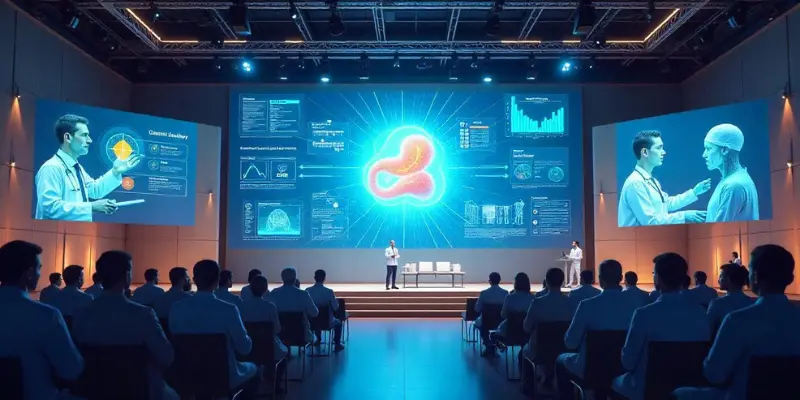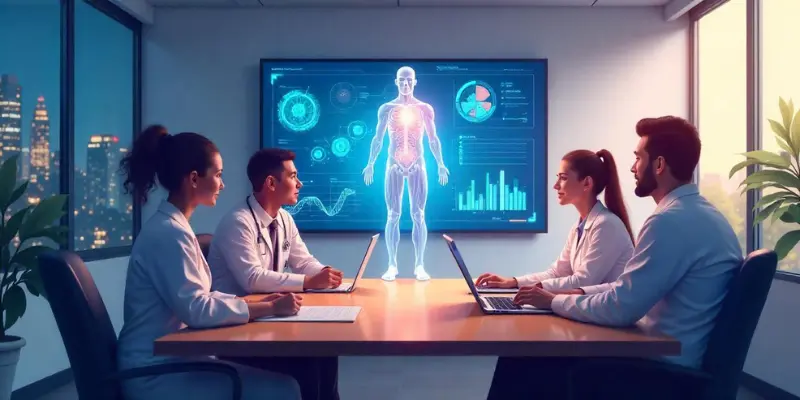AI Trends From Recent Healthcare Conferences
Published: 6 Mar 2025
Artificial intelligence is reshaping healthcare faster than ever. In 2023, the five largest health systems in the U.S. implemented AI in various areas, including marketing, telehealth and emergency medicine. At the biggest stage of global AI in healthcare conferences, industry leaders discuss its latest breakthroughs—from AI-powered imaging to predictive analytics. But what exactly are the biggest takeaways from these events? Let’s take a deep dive and find out the latest AI trends that have been discussed.

Why AI is a Big Topic at Healthcare Conferences
AI is upgrading healthcare at a rapid pace. From diagnosing diseases faster to improving patient care and performing surgeries with robotic arms, AI is making a huge impact. That’s why it’s a hot topic at every AI in healthcare conference worldwide.
Growing Investment in AI for Healthcare
Healthcare companies are investing billions in AI. Hospitals and startups are racing to develop more AI-powered tools for faster diagnoses, better treatments and efficient hospital management. Conferences bring together doctors, researchers and tech leaders to discuss these advancements.
AI’s Role in Solving Healthcare Challenges
Traditional healthcare has been changed by AI which is helping to solve many important issues in healthcare including:
Doctor shortages – AI chatbots and virtual assistants help in managing patient queries and narrowing the need of doctors
Medical errors – It is a wise saying that ‘To Err is Human’, after too much hard work man can make mistakes, but usually AI don’t. AI is improving accuracy in diagnosing diseases.
Rising costs – Hospitals and clinics spend a lot on performing repetitive tasks. AI can reduce hospital expenses by automating them.
Which AI Topics Dominate Healthcare Conferences?
At recent AI in Healthcare conferences, these AI applications in healthcare made headlines:
- AI-powered medical imaging: Helping doctors detect diseases faster by having the ability to scan large numbers of images in seconds
- Predictive analytics: Identifying health risks before symptoms appear
- AI chatbots: Providing 24/7 patient support
- Robotic surgery: Assisting in complex procedures with higher precision.
AI has 9 different types which are important to understand if you are seeking to make a shining career ahead of Healthcare AI. Also read a detailed article on Types of AI in healthcare.
AI is no longer just a futuristic idea. It’s already influencing hospitals, clinics and research labs. That’s why every major healthcare conference focuses on AI trends and innovations.

Major AI Trends Discussed at Recent Healthcare Conferences
Artificial Intelligence (AI) is revolutionizing healthcare and bringing innovations that enhance patient outcomes and streamline medical processes. Recent AI in healthcare conferences have spotlighted several key trends:
1. AI-Powered Diagnostics and Imaging
How to bring more accuracy and increase AI adoption was a hot topic in the recent AI in healthcare conferences. AI is transforming medical diagnostics by enabling faster and more accurate analyses of medical images. AI can analyze more images in a short time with higher accuracy than humans.
- Enhanced Imaging Analysis: AI algorithms can swiftly process vast amounts of imaging data, aiding radiologists in identifying abnormalities more efficiently.
- Real-World Example: At the AI+HEALTH 2024 conference hosted by Stanford Medicine, experts discussed AI’s role in improving diagnostic accuracy and efficiency in medical imaging.
2. AI in Personalized Medicine
AI in personalizing medicines and treatments for different people. It was also a topic to light on in the AI in Healthcare Conference. AI facilitates the development of personalized treatment plans by analyzing individual patient data.
- Tailored Treatments: By integrating imaging data with electronic health records, AI provides a comprehensive view of a patient’s health, allowing for customized care strategies.
- Conference Insight: The 22nd International Conference of AI in Medicine (AIME 2024) featured discussions on AI’s role in creating personalized medicine approaches.
3. AI Chatbots and Virtual Assistants in Healthcare
AI has brought a revolution in home care, there was discussion about the ways to improve the Chatbots services with more human-like responses. AI-powered chatbots are enhancing patient engagement and reducing the workload on healthcare staff.
- Patient Support: AI chatbots handle routine inquiries, appointment scheduling and symptom assessments. It allows healthcare professionals to focus on more complex tasks.
- Industry Example: At the AI in Health Conference in Houston, discussions highlighted how AI virtual assistants are improving patient interactions and operational efficiency.
4. Predictive Analytics for Disease Prevention
How to bring innovations in the ability of AI to estimate the disease, was a repeat discussion. AI’s predictive capabilities are aiding in early disease detection and prevention strategies.
- Early Intervention: By analyzing historical imaging data, AI can predict disease progression and enable timely prevention. This feature has personalized the treatment plans.
- Conference Highlight: Many AI in Health Conference in 2024 showcased how AI predictive analytics are helping in making vital clinical decisions and healthcare delivery.
Also Read: History of AI in Healthcare
5. AI in Robotic Surgery and Automation
A normal person can’t believe a robot can do important surgeries, thus this topic was also part of the discussion. AI integration in robotic surgery is enhancing precision and it has increased the outcomes in surgical procedures.
- Surgical Assistance: AI-powered robots assist surgeons in performing complex procedures with greater accuracy, reducing the risk of complications.
- Technological Advancement: Hospitals like Guy’s and St Thomas’ NHS Foundation Trust are using robots for surgeries which showcase AI’s role in modern medical procedures.
6. AI and Healthcare Data Security
This topic is widely discussed in all the problems AI have in healthcare. As healthcare becomes more digitized, AI plays a crucial role in safeguarding patient data.
- Cybersecurity Measures: AI systems detect and prevent cyber threats, protecting sensitive medical information from potential breaches.
- Industry Practice: Hospitals like Princess Alexandra Hospital NHS Trust have implemented stringent security measures to protect against cybersecurity threats.
Key Takeaways from Recent AI in Healthcare Conferences
Healthcare AI is evolving very fast. Every year, experts from different healthcare fields gather at conferences to discuss breakthroughs, challenges and future directions. Here are the key takeaways from recent events that are shaping the future of AI in healthcare.
AI is No Longer Just a Research Topic—It’s in Everyday Healthcare
AI-powered tools are now being actively used in hospitals and clinics and are no longer limited to research labs. AI is helping doctors to diagnose diseases, predict patient outcomes and improve hospital efficiency.
✅ Example: Mayo Clinic has integrated AI-driven imaging tools to detect diseases earlier and improve treatment plans.
Ethical AI and Bias Reduction Are Top Priorities
Many discussions focused on making AI fair and unbiased. AI models trained on limited data can misdiagnose patients from diverse backgrounds. Experts at major conferences stressed the need for diverse datasets and transparent AI decision-making.
✅ Example: Stanford’s AI in Healthcare Initiative is working on AI models that reduce bias in medical diagnostics.
AI-Powered Predictive Analytics is Transforming Preventive Medicine
Hospitals are using AI to predict diseases before symptoms appear. Predictive analytics help doctors to take early action and improve patient outcomes.
✅ Example: Mount Sinai Health System uses AI to predict heart disease risk based on electronic health records.
AI in Drug Discovery is Speeding Up Medical Breakthroughs
Pharmaceutical companies are leveraging AI to develop new drugs faster. Instead of taking years, AI algorithms now help researchers identify potential drug candidates in months.
✅ Example: AI-driven drug discovery helped develop new antibiotics at MIT’s Jameel Clinic.
AI is Enhancing Patient Engagement and Telemedicine
AI chatbots, virtual health assistants and AI-driven telehealth platforms are making healthcare more accessible. Patients can now get quick medical advice and schedule appointments without waiting for hours.
✅ Example: Cleveland Clinic has AI-powered chatbots that assist patients in finding the right doctors and booking appointments.
Read a detailed article on How AI is Helping in Patient Engagement?
How Healthcare Professionals Can Adapt to These AI Trends
AI is changing healthcare and professionals must keep up to stay relevant. Here’s how doctors, nurses and medical staff can adapt to AI trends:
- Learn the Basics of AI: Healthcare professionals don’t need to be AI engineers, but understanding how AI works helps them use it effectively in patient care. Many free online courses offer AI training for medical professionals.
- Stay Updated on AI in Healthcare: AI trends change very fast. Attending AI in healthcare conferences, reading research papers and following healthcare AI news can help professionals stay informed.
- Use AI Tools in Daily Practice: Hospitals are integrating AI into diagnostics, patient monitoring and administrative tasks. Learning to use AI-powered imaging tools, chatbots and predictive analytics can improve efficiency.
- Develop Critical Thinking with AI Assistance: AI can assist, but it’s not perfect. Healthcare professionals should validate AI recommendations and make final decisions based on medical experience.
- Advocate for Ethical AI Use: Doctors and nurses should speak up about AI-related concerns like bias, data privacy and patient safety. They can shape hospital policies on ethical AI use.
- Collaborate with AI Developers: Medical professionals and AI engineers should work together to develop AI tools that actually help patients. Giving feedback on AI-powered medical devices can lead to better innovation.
- Participate in AI Training Programs: Many hospitals are offering AI workshops and training sessions for healthcare staff. Taking part in these programs can help professionals feel more confident in using AI.
- Prepare for AI-Driven Administrative Changes: AI is automating hospital tasks like scheduling, billing and patient record management. Learning how AI-based hospital systems work can make day-to-day tasks easier.
- Embrace AI for Better Patient Engagement: AI-powered chatbots and virtual health assistants are helping doctors communicate with patients more efficiently. Learning to use these tools can improve patient experience and trust.
- Push for AI Regulations and Standards: AI in healthcare needs clear guidelines. Healthcare professionals can advocate for regulations that ensure AI tools are safe, unbiased and effective.
Conclusion
So guys, in this article, we’ve covered “AI in healthcare conference” in detail. If you want to stay competitive in the medical field, then keeping up with AI trends isn’t optional—it’s essential. My advice? Pick a conference that aligns with your interests and career goals. Whether you’re a doctor, researcher or hospital administrator, these events will help you navigate the future of AI in medicine. Have you ever attended an AI healthcare conference before? Share your experience in the comments!
FAQS about AI Trends From Recent Healthcare AI Conferences?
Here are some frequently asked questions about AI in healthcare conference;
AI is changing healthcare fast and conferences help you stay updated. You’ll learn about new AI tools, ethical concerns and real-world applications. Plus, networking with experts can open new career opportunities.
No, these conferences are for healthcare professionals, researchers, administrators and tech enthusiasts. These sessions are designed for different knowledge levels, from beginner to advanced. Anyone interested in AI’s impact on healthcare can benefit.
Topics include AI in diagnostics, robotic surgeries, patient monitoring, drug discovery and hospital management. Ethical AI, data privacy and real-world case studies are also common discussions. Each conference focuses on practical applications and future trends.
Yes! Many organizations like Stanford HAI, AI Med, and WHO offer free virtual AI healthcare webinars. You can also find recorded sessions on YouTube or official event websites.
Look at the conference agenda, speaker list and focus areas. If you’re a doctor, choose one that covers AI in diagnostics or patient care. If you’re into research, go for events discussing AI innovations and clinical studies.
No, AI is designed to assist, not replace healthcare professionals. It automates repetitive tasks and provides decision support, but human expertise is still essential. Doctors and nurses will work alongside AI to improve patient care.





